- Home
- Lauren Willig
That Summer: A Novel Page 15
That Summer: A Novel Read online
Page 15
Sometimes she would imagine herself taking up residence in one of those rooms, like the runaway children in From the Mixed-up Files of Mrs. Basil E. Frankweiler. Not that she would have, of course. Both the museum administrators and her father would have taken a dim view of that.
“No surprise, then, that you pegged that painting straight off,” said Nick.
“Well, it was pretty obviously not a Rubens,” said Julia, deadpan.
A pained expression crossed Nick’s face. He pressed his eyes briefly shut. “Look, I owe you an apology. I was being a bit of a shit on Saturday. I shouldn’t have taken it out on you.”
Taken what out? He didn’t seem inclined to go on, so Julia said neutrally, “If it makes matters better, I wasn’t exactly being a queen of graciousness, either.”
Nick held out a hand. “Truce?”
His clasp was warm and firm. He wore a battered gold ring on one finger. Not a wedding ring, a signet, the crest worn to almost nothingness.
“Truce,” Julia agreed, and tried to smother a slight sense of unease. If Nicholas Dorrington, arrogant and annoying, was attractive, this new, friendly version was deadly.
Not that it mattered. Their relationship was purely professional. Julia shook his hand more briskly than necessary, just because.
Ushering her farther into the shop, he said, “If it helps to make amends, I have a date for you on your painting, or at least an approximation of one.” When Julia looked at him expectantly, he went on, “It was painted no earlier than 1848 and no later than 1850.”
Julia cocked her head. “No earlier than 1848 because that’s when the brotherhood was founded and no later than 1850 because that’s when they stopped using the initials?”
Nick’s face relaxed into a grin. “You’ve been doing your research.”
“Wouldn’t you?” Researching painters sure beat tracking down financial reports. She’d forgotten how much she missed this sort of thing. “What did your friend have to say? The art historian?”
“She has a name for you.” Slipping past Julia, Nick turned the store sign from Open to Closed and flicked the latch on the door. “Gavin Thorne.”
It wasn’t as though she’d really been hoping for a lost Millais.… But Julia couldn’t help feeling a little disappointed all the same. Gavin Thorne?
“I’ve never heard of him,” she admitted.
The corners of Nick’s lips quirked. “If it helps, I hadn’t, either. He was one of the original group, along with a few other blokes who didn’t make the Dictionary of National Biography. Only three of them stuck it out.”
“Rossetti, Hunt, and Millais,” Julia supplied for him. Oh, well. It really would have been too much to expect her painting to be by one of them. But there was something about it, something so vivid and compelling. It was hard to believe that whoever had painted it hadn’t attained any kind of professional renown. “On the phone, you mentioned something about illustrations?”
Nick was all business. “I can’t tell you much about Thorne—there doesn’t appear to be much out there—but I did get hold of copies of his extant oeuvre. He’s definitely our man.” Nick gestured towards the half-open door at the back of the shop. “The pictures are in the office. Care to take a look?”
That was a silly question.
Good manners forced her to say, “If you have time…”
“My plans are the opposite of pressing.” When Julia looked at him quizzically, he clarified, “Takeaway and televised snooker.”
There really was something about that smile … Julia told herself to get a grip.
“I don’t know,” she said, following him as he led the way into the office. “I’m not sure I can cope with the guilt of tearing you away from snooker.”
Nick raised a brow. “I’m sure you’ll find a way to live with yourself.”
His office wasn’t the bland, modern variety but a cozy den, with a sofa upholstered in tattered chintz and a scarred old desk that Julia guessed was probably early twentieth century. The walls were crammed with books, a haphazard collection of reference books, binders, glossy coffee-table books of antiques, and a healthy selection of popular history and biography. A globe stood in one corner of the room, by a battered metal file cabinet.
Nick flipped open the lid, revealing a series of bottle tops. “Drink?”
“How could I say no to that?” There was something rather endearing in his obvious pleasure in his toy, like a little boy with a new battery-powered car. “Very cool bar.”
“It’s a repro, but it means I don’t have to feel guilty if I slosh scotch on it.” Nick held up two bottles. “Scotch or wine?”
“I’ll take the scotch.” She’d learned in business school that she had a tolerance disproportionate to her size. There were few things more entertaining than drinking large men under the table.
“A wise choice.” Nick grabbed two mismatched glasses from a shelf that also held a collection of mugs, a coffeemaker, and a scattering of old sugar packets. “That wine was left over from our last open house. It wasn’t particularly good then and it’s probably even worse now.”
“Thanks.” Julia took the glass from him. Scotch. Straight up. He didn’t offer water or ice.
“Cheers,” he said briskly. He clinked his glass briefly against hers, then reached out to pull over an oversized folder that was sitting on top of the debris on his desk. “Behold. The collected oeuvre of Gavin Thorne.”
Nick’s hands dealt out colored prints like playing cards, fanning them across the desk, one after the other.
“Ulysses … Locksley Hall … Mariana in the Moated Grange … Lancelot Denied the Grail…” Nick stepped back, gesturing Julia forward. As she leaned over the printouts, he added briskly, “All in chronological order. Ulysses is currently at the British art center in New Haven, Locksley Hall is at the Delaware Art Museum, Mariana is at the Tate, and Lancelot is in the hands of a private collector.”
Women in clinging gowns, men in knightly garb, rich colors, elaborate details. They all looked pretty Pre-Raphaelite to her.
Ulysses was the only one that struck a note of “one of these things is not like the others.” The faux Grecian garb looked awkward on the model, and the details of the background scene, presumably a Greek island, based on the amount of sand and what Julia supposed were olive trees, were less well realized than in the later paintings, where the painter had fallen into his stride with a medieval landscape that seemed to come much more naturally to him.
In all of them, however, there was a general overarching air of loss: Ulysses staring off to sea while his shipmates partied around him, the soldier turning away from the gates of his old home, Mariana at her window, Lancelot veiling his eyes as the Grail was borne away from him.
“All of Thorne’s mature works represent themes of isolation and loneliness,” proclaimed Nick importantly. Dropping the Masterpiece Theatre voice, he added, “I quote from the Art Institute exhibition catalog where these were last displayed. You can read into them what you will.”
Julia hadn’t read that into her painting, her Tristan and Iseult. Loneliness? No. Quite the opposite. In that one, the lovers were bound together—emotionally, by the intensity of their gaze, and physically, by their twined hands around the base of the cup.
Speaking of that cup … Juliana pointed at the printout of Mariana, at the table by the window. “That’s the same cup from my painting.”
She could feel Nick’s breath on her hair as he leaned over her shoulder to see. “They often reused props. The early Pre-Raphaelites were especially keen on only painting from actual examples. That narrowed the field a bit for them.”
“More Art Institute exhibition catalog?” said Julia, glancing up at him.
“No, Wikipedia,” he said, straight-faced.
“Uh-huh. Sure.” Julia turned back to the pictures fanned out across his desk. “What about Thorne’s other paintings?” Nick had only shown her the four that had been gathered for that one exhibition. “Where a
re the rest of them?”
It took Nick a moment to answer, and when he did she could hear the change in his tone. “These are the rest of them. There are only four works extant, all four dating between 1848 and 1850.”
When Julia looked up at him in surprise, he added, “By the spring of 1850, Gavin Thorne had disappeared never to be heard of again.”
Herne Hill, 1849
“We missed you last week.”
When Gavin arrived at the summerhouse, Imogen Grantham was already there, as she always was, a book in her hand and a plate of tea cakes next to her. The day was a warm one and the rosewater icing on the cakes was already beginning to melt, but Gavin felt his spirits lift all the same, as they did whenever he saw her.
No matter how long and dusty the road, in the garden there were cakes and the scent of flowers. And Imogen.
Imogen. Aloud he still called her Mrs. Grantham, as she called him Mr. Thorne, maintaining all the formal niceties, but in his head she was Imogen, as he had heard Miss Cooper call her. There could be no impropriety in it, so long as he never took the liberty of addressing her so. It was just a way of fixing his mind on her personality for the portrait, that was all. The name suited her. “Mrs. Grantham” sat upon her like an ill-fitting suit of clothes.
As spring warmed to summer, they had fallen into a regular pattern in their sittings. Every Monday, Gavin would make his way to Herne Hill, where Imogen would be waiting in the summerhouse, with a plate of cakes ostensibly for her but really for Gavin. She had discovered, somewhere in the first month of their acquaintance, that Gavin had a taste for sweets, and first currant cakes and then jam-filled sponge had appeared with increasingly regularity on a china plate on the bench beside her.
It had been nearly two months now. Two months of Mondays, and tea cakes, and conversation, two months of the heady scent of flowers and the gentle drone of the bees in the rosebushes. There was a leisurely, enchanted quality to these Mondays, as though they might go on forever, just the same.
But, of course, they wouldn’t. Summer wouldn’t last forever, and neither would this commission. The portrait had been coming along well. Too well. Gavin had wrestled with her face and her expression—longer, perhaps, than he ought, ascribing his diligence to professional pride. Grantham was paying him a pretty penny, after all. But the hardest part was long since done and only the journeyman work remained. The leaves on the trees behind her, the planks beneath her feet. Much of which could, realistically be completed back in his studio.
He should tell Mr. Grantham so. But he hadn’t.
It was mid-July already. Within a week, two at most, the portrait would be done. The thought of it filled him with something approaching physical pain.
“Yes, last week,” Gavin said, and busied himself unpacking his paints and his palette. “Mr. Grantham received my note?”
“Yes, he did, and he quite understood.” Imogen tilted her head, her expression quizzical. “The garden felt very empty without you. I had to eat all the tea cakes myself.”
More likely, she fed them to the birds. He had a sudden image of her, leaning over the railing, scattering crumbs to the birds gathered around her, graceful and solitary.
Gruffly Gavin said, “I’d other work to get through, and the press of time—” True enough, as far as it went, but not the whole truth.
He’d stayed away to see if he could, like a prospective martyr holding a finger over a flame to steel himself to bear the full force of the fire.
“Other portraits?” Imogen grimaced comically, but there was a hint of wistfulness beneath it. No matter how easy they were with each other, no matter how many Mondays they spent together, there was always a bit of herself she held in reserve. “Have I set a new pattern for you?”
“No other portraits. Augustus is the portrait painter, not I.” Gavin debated telling her the truth. It wasn’t something widely known, and certainly not something that would do him any good on his goal to eventually become an Academician someday. “I draw pictures for the penny dreadfuls. Story pictures.”
Imogen’s face brightened with interest. “I’ve never read one, although I’ve seen Anna with them.” She leaned forward, sending the pattern of light and shades playing along the folds of her skirt shifting. “Do you mind it? The time away from your painting?”
Gavin mixed his colors together, shades of gray for the weathered boards beneath her feet. “When I’ve an idea making my fingers itch and not enough time to paint it? Then I mind it. But the penny dreadfuls pay for the paint and canvas. Besides that … It’s a challenge, getting so much emotion into such a little space, and doing it without color. Everything has to be in the force of the lines.”
Imogen nodded, considering. “It’s a bit like the idea of a story cycle in paintings, but writ smaller.”
“And cruder,” said Gavin ruefully. The last one he had done had involved a highwayman who met a particularly gory end.
Imogen waved a hand in dismissal. “Let us call it ‘bolder.’ Is it a great deal of work?”
It was more time-consuming than he would have liked it to be, but it paid. They all had their ways of making ends meet. And it was good to know that he could make his living purely by his brush. His father had mocked and cuffed him, but here he was, Mr. Thorne, with his own studio and his name listed in the Royal Academy exhibition catalog for all to see. For that he would have done far more and far worse. “I don’t mind being busy. I’d mind more not.”
“Yes,” Imogen said, and he saw sadness pass across her face like the shadow of the leaves on the summerhouse floor. “I never understood why boredom was a disease until I found myself afflicted with it. It’s pure self-indulgence, of course. I keep reminding myself that it’s a privilege to have the luxury to be bored.”
“What would you do if you could do it?” Gavin studiously kept his eyes on his painting, giving her space to answer, if she would. She spoke without reserve of books and ideas, her face lighting with interest, but personal questions tended to drive her back behind her shell.
Not that he ought to blame her. He shied from questions about his own life as much as she did hers.
Imogen scuffed the toe of her leather shoe against a scratch on the floorboard. “Surround myself with dusty manuscripts and write dry books about the Middle Ages, I imagine.” With a shrug and a smile she changed the subject. “While you were away, your friend came to call.”
“Rossetti?” He would have thought Gabriel too much occupied with scribbling nonsense for his new magazine, The Germ, meant to be the mouthpiece of their movement but, really, just an excuse for Gabriel to avoid getting on with his Annunciation.
“No, the other one,” said Imogen. Her voice made eminently clear what she thought of him. “Mr. Fotheringay-Vaughn.”
“He’s not my friend,” said Gavin brusquely. “We share a studio, that’s all.”
Augustus was seldom there. Unlike Gavin, who lived in the apartment attached to the studio, Augustus had lodgings elsewhere, paid for, Gavin suspected, by one of the many ladies of a certain age whom Augustus flattered in paint and squired so assiduously about town.
From long ago, in the frost and cold, he could hear Augustus’s voice, saying, musingly, A prime piece.
He’d hoped Augustus had forgotten about Evangeline Grantham, had found some greater heiress to pursue. Apparently, he had been wrong.
“I thought as much,” said Imogen matter-of-factly. “He claimed he came to see the Book of Hours, and then spent a full hour making eyes at Miss Grantham.”
Damnation. And damn Augustus, too. He’d known Gavin wouldn’t be at Herne Hill, would have his head down over his illustrations, more than enough time to work some mischief.
Gavin only hoped that was all Augustus had been doing.
Should he warn Imogen, tell her what Augustus really was? Not that Gavin knew for sure. It was all just suppositions, mere gossip and guesswork. He didn’t know what to say, so he merely said brusquely, “She should be careful of
him.”
And you should be careful of me.
The words stuck, unsaid, in his throat. Ridiculous, too. Why should she be careful of him? She had no thought of him except as her portraitist. And, perhaps, if he was very fortunate, as a friend. Every confidence, every bit of herself she shared, no matter how small, felt like a minor triumph. He wanted to unravel the layers of her mystery, to get to the very heart of her—not for the portrait, but for himself.
And that, he realized, was a very dangerous idea.
“I’d gathered that. I’ve sense enough to know a rotten apple when I see one,” said Imogen wryly, and it took Gavin a moment to remember that she was talking about Augustus. “What I don’t know is how to be rid of him.” Her voice caught. “He’s stuffed Evie’s head full with his grand friends and his aristocratic connections.”
Aristocratic connections all of Augustus’s own devising. Gavin almost spoke the words, but old habit kept him silent.
Imogen went on, her hands gesturing expressively. “You should have heard him at tea last week! It was all heavy hints about the title that would have been his but for cruel, cruel fate. He’s half-convinced Evie that he’s the lost heir of a Gothic drama.” She tried to make a joke of it, but the worried lines between her brows betrayed her true emotions. “Jane would say it was my fault for letting her read novels. Miss Cooper, I mean.”
Her hands knotted tightly together in her lap, the knuckles showing white against the a stuff of her dress. Gavin remembered Imogen, watching Miss Grantham, the night of the dinner party, stepping between Miss Grantham and Augustus, protecting her as best she could.
What right did Augustus have to Gavin’s loyalties?
Abruptly Gavin said, “It’s not true. None of it. His aristocratic connections, that is.” Some residual sense of fairness prompted Gavin to add, “The popularity of his portraits is real enough. He’s a dab hand at bringing out the best in his subjects. He’ll go far, they all say.”

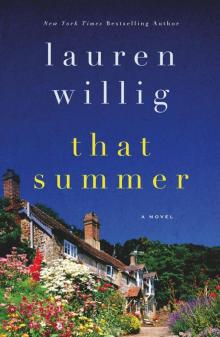 That Summer
That Summer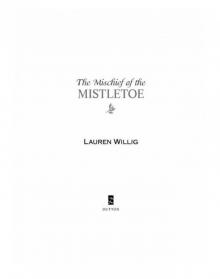 The Mischief of the Mistletoe
The Mischief of the Mistletoe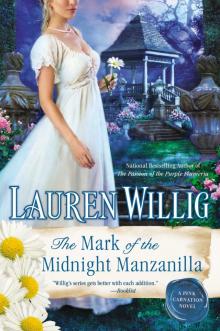 The Mark of the Midnight Manzanilla
The Mark of the Midnight Manzanilla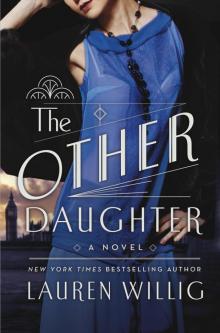 The Other Daughter
The Other Daughter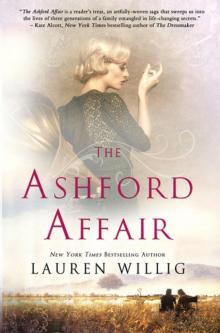 The Ashford Affair
The Ashford Affair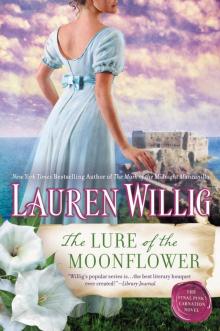 The Lure of the Moonflower
The Lure of the Moonflower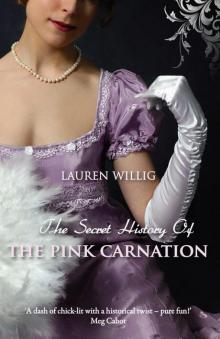 The Secret History of the Pink Carnation
The Secret History of the Pink Carnation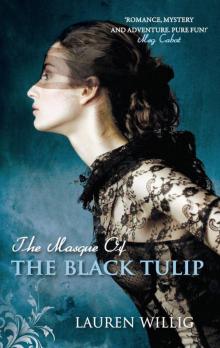 The Masque of the Black Tulip
The Masque of the Black Tulip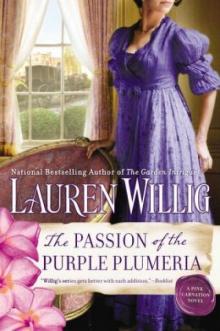 The Passion of the Purple Plumeria
The Passion of the Purple Plumeria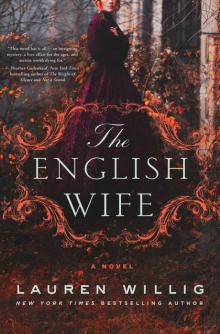 The English Wife
The English Wife The Garden Intrigue
The Garden Intrigue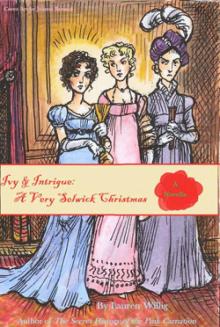 Ivy and Intrigue: A Very Selwick Christmas
Ivy and Intrigue: A Very Selwick Christmas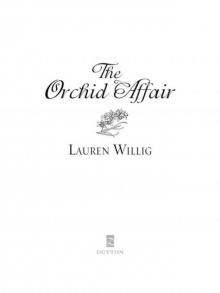 The Orchid Affair
The Orchid Affair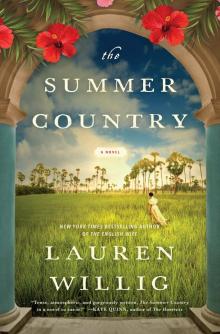 The Summer Country
The Summer Country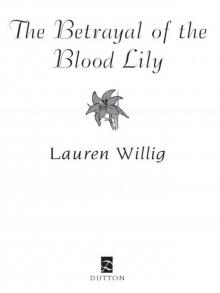 The Betrayal of the Blood Lily
The Betrayal of the Blood Lily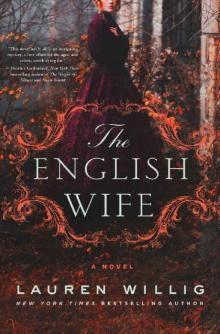 The English Wife: A Novel
The English Wife: A Novel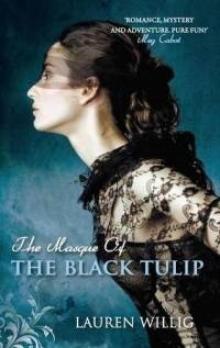 Masque of the Black Tulip pc-2
Masque of the Black Tulip pc-2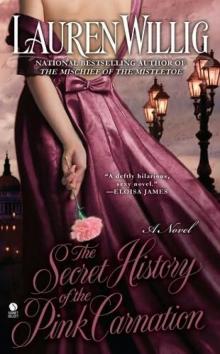 The Secret History of the Pink Carnation pc-1
The Secret History of the Pink Carnation pc-1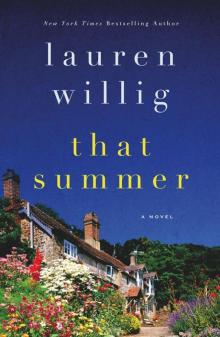 That Summer: A Novel
That Summer: A Novel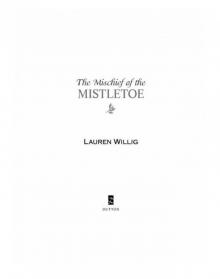 The Mischief of the Mistletoe: A Pink Carnation Christmas
The Mischief of the Mistletoe: A Pink Carnation Christmas